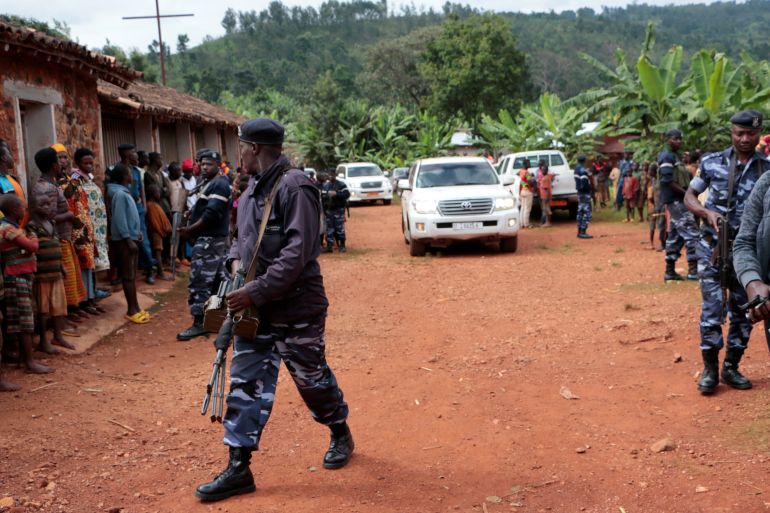HRW decries ‘serious human rights violations’ in Burundi
The rights group says authorities have responded to attacks nationwide with a heavy-handed approach.

Burundi’s security agencies have committed violations against people suspected of belonging to opposition parties or of working with armed opposition groups, according to Human Rights Watch.
In a report published on Wednesday, the United States-based rights group said national intelligence services, police, and governing party youth members have responded to attacks on both civilians and state agents in the country with a heavy-handed approach.
Keep reading
list of 4 itemsArrest warrant issued for Burundi’s exiled opposition leader
Burundi probes grenade blasts, pledges to stamp out ‘terrorists’
Huge fire tears through Burundi prison, kills dozens
The HRW said the authorities have shown little regard for credible investigations, objective evidence, or due process needed to hold those actually responsible for the attacks, to account.
“Instead of targeting perceived opponents, President Evariste Ndayishimiye’s administration should focus on bringing those responsible for abuse to justice, including members of the security forces,” said Clémentine de Montjoye, Africa researcher at HRW.
“Burundians will only stop living in fear when their tormentors are held to account,” she added.
HRW said it interviewed more than 30 people, including victims and witnesses of violations, family members, opposition party representatives, and Burundian human rights defenders between October 2021 and April 2022.
The rights group said it also analysed and authenticated footage showing several army and police officers admitting to killings and reviewed the reports of local and international human rights organisations, media reports, public speeches of government officials, and social media posts.
EU, US criticised
The rights group criticised the European Union, the United States and other countries for pursuing a policy of rapprochement with the Burundi authorities despite overwhelming evidence of rights abuses.
“Governments and regional and international institutions engaging with Burundi should ensure that serious human rights violations … are on the agenda and that concrete and measurable actions are proposed to address them,” HRW said.
It called on the government to publicly condemn human rights violations, and conduct transparent investigations to hold suspects accountable.
The HRW also said armed groups in Burundi should cease committing human rights abuses and acts of violence against state agents and civilians.
In 2015, Burundi’s then-President Pierre Nkurunziza sought to change the constitution to hand himself a third term. He faced significant internal and external political opposition – including a failed coup attempt.
His government responded by unleashing a wave of political violence, persecution and human rights violations against real and perceived opponents. Burundi was sent into a tailspin of violent clashes, and political and economic uncertainty.
Since then, the EU and the US first imposed visa restrictions on the perpetrators of the violence. Wide-ranging economic sanctions soon followed in response to Nkurunziza’s destructive actions.